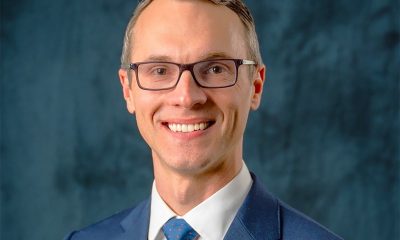homepage news
Trump immigration policy sparks concern on US-Mexico border
Calif., Baja California activists working with LGBTI migrants
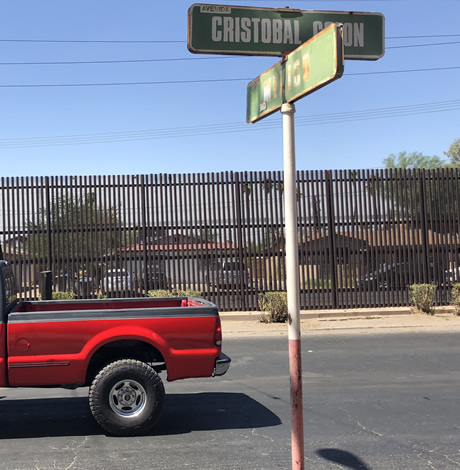
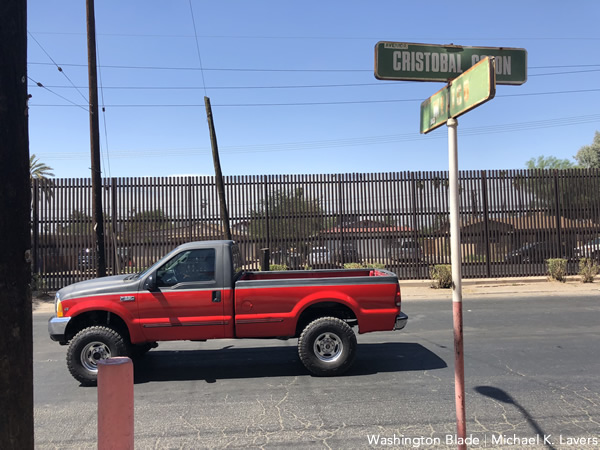
A pickup truck drives on a road in Mexicali, Mexico, on July 21, 2018. The road abuts the fence that marks the Mexico-U.S. border. (Washington Blade photo by Michael K. Lavers)
A California woman and her bachelorette party, several drag queens and strippers were among the hundreds of people who were at the club that is three blocks from the Mexico-U.S. border. Patrons at Taurinos Bar, a gay bar that is a few blocks south of Porky’s Divine, were playing pool and drinking beers as they listened to songs from Ricky Martin and other Latino pop stars.
“[The LGBTI community in Mexicali] is very big,” Axxel Rodríguez, the manager of Taurinos Bar, told the Washington Blade from behind the bar.
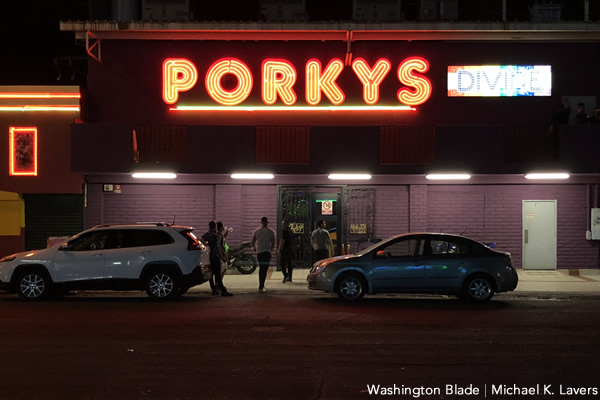
Porky’s Divine is a gay club in Mexicali, Mexico, that is located three blocks from the Mexico-U.S. border. (Washington Blade photo by Michael K. Lavers)
Mexicali, Tijuana and other Mexican border cities and towns have longstanding economic and cultural ties with neighboring communities in the U.S. President Trump’s “zero tolerance” immigration policy has not severed them.
The Imperial Valley LGBT Resource Center in El Centro, Calif., a city in the Imperial Valley which is roughly 12 miles north of the U.S.-Mexico border, provides services to upwards of 300 people each month. These include support groups for transgender people that are in English and Spanish and the annual Imperial Valley Pride that takes place in El Centro each October.
Imperial Valley LGBT Resource Center CEO Rosa Díaz told the Blade on July 20 during an interview at her office that many students with whom her organization works live in Mexicali but go to school in the Imperial Valley.
Díaz and Rev. Ron Griffen of the El Centro First United Methodist Church, who works closely with the Imperial Valley LGBT Resource Center, also noted many people who live in Mexico work in California. Migrant workers who are permanent residents of California and can work legally in the U.S. are eligible to receive state Medicaid and other public assistance.
“People in Mexicali or Tijuana work in California and then they go back,” Griffen told the Blade on Monday during a telephone interview from El Centro.
Businesses that advertise immigration-related services are a common sight throughout the Imperial Valley.
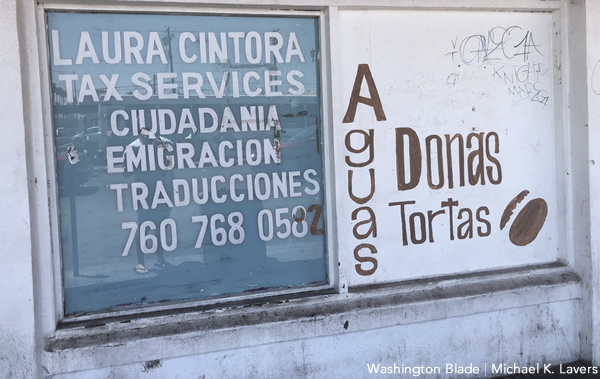
The offices of a lawyer who provides immigration-related services are located inside a restaurant in Calexico, Calif. (Washington Blade photo by Michael K. Lavers)
Americans who cannot afford prescription drugs, dental or eye care in the U.S. frequently travel to Tijuana, Mexicali and Los Algodones, a small Mexican town on the Colorado River that borders Andrade, Calif., to visit pharmacies, dentists and optometrists.
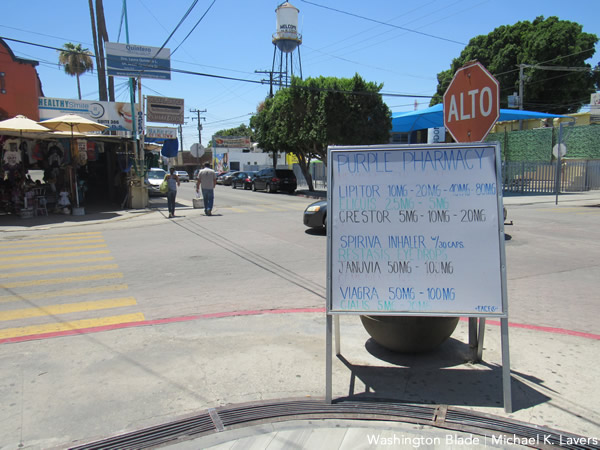
A pharmacy in Los Algodones, Mexico, advertises medications for sale on July 22, 2018. The town, which is across the Mexico-U.S. border from Andrade, Calif., is a popular destination for Americans who are looking to purchase medications that cost less than they do in the U.S. (Washington Blade photo by Michael K. Lavers)
Long lines of traffic were waiting to enter the U.S. at the San Ysidro and Calexico ports of entry throughout the day on July 20 and July 21 respectively.
U.S. Border Patrol has set up a permanent checkpoint on the westbound lanes of Interstate 8 near Pine Valley, Calif., which is roughly 45 minutes east of San Diego. Another permanent Border Patrol checkpoint is located on the eastbound lanes of the same interstate outside of Yuma, Ariz.
A Border Patrol agent at the Pine Valley checkpoint on July 20 asked this reporter whether he was a U.S. citizen before she allowed him to drive through. Another Border Patrol agent a couple of hours later briefly interrogated this reporter after he took pictures through the border fence at Border Field State Park in Imperial Beach, Calif.
LGBTI migrants chosing to stay in Mexico
Activists on both sides of the border with whom the Blade spoke last month said Trump’s immigration policy that includes the separation of migrant children from their parents has sparked fear among migrants, regardless of their sexual orientation and/or gender identity.
Comunidad Cultural de Tijuana LGBTI, an LGBTI community center in Tijuana that is located a few blocks from the San Ysidro port of entry, and Espacio Migrante, another Tijuana-based organization, work to provide shelter and other resources to LGBTI migrants in the city. The groups also offer assistance to members of the LGBTI community who have been deported from the U.S.
The Blade has also spoke with an activist in Mexicali who works with LGBTI migrants.
Jorge Luis Villa, coordinator of Espacio Migrante’s Proyecto Diversidad Migrante, said during an interview in downtown Tijuana on July 20 that four trans women between the ages of 16 and 22 and a young gay man were part of a caravan of migrants that arrived in the city in 2017. Villa also pointed out a 300-person caravan of migrants that traveled to Tijuana in late April included 30 people who were LGBTI.
Villa said two of the four trans women who arrived in Tijuana in 2017 have asked for asylum in the U.S. He told the Blade the two other trans women — siblings from Honduras — are currently working in Tijuana’s Zona Norte, a neighborhood near the Mexico-U.S. border in which sex workers frequently work.
Villa said the gay man who traveled to Tijuana with the four trans women is now in the Mexican state of Veracruz and trying to normalize his immigration status in the country.
Rodríguez told the Blade there are trans sex workers in Mexicali who are from Honduras, a Central American country in which violence and discrimination based on gender identity and sexual orientation is commonplace. He also told the Blade there are migrants from Haiti and from “all over” gather at a park that is four blocks from Taurinos Bar and in other areas of the city’s downtown area.
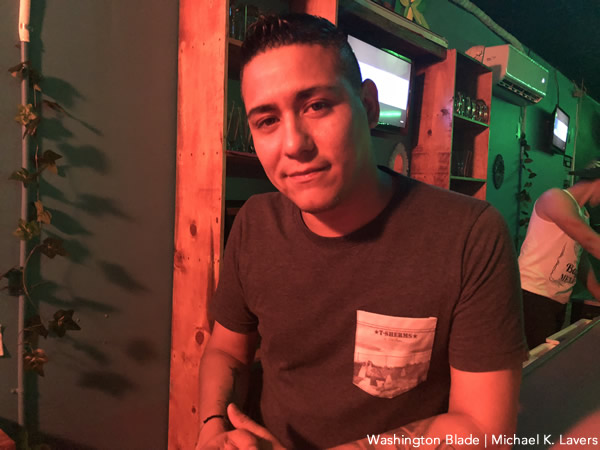
Axxel Rodríguez manages Taurinos Bar, a gay bar in Mexicali, Mexico, that is less than a mile from the Mexico-U.S. border. (Washington Blade photo by Michael K. Lavers)
Roxana Hernández, a trans Honduran with HIV who was among the group of 300 migrants who arrived in Tijuana in late April, was taken into custody by U.S. Customs and Border Protection on May 9 after she asked for asylum at the San Ysidro port of entry. Hernández was held at the Cibola County Correctional Center in New Mexico before she died at a local hospital on May 25.
U.S. Rep. David Cicilline (D-R.I.) told the Blade in June after he traveled to South Texas there are no policies in place that specifically address the needs of LGBTI migrant children who have been separated from their parents.
Villa has developed relationship with officials in the state of Baja California’s government who work with migrants.
He said the Mexican federal government’s immigration policy “has been created with the LGBT community in mind,” but he conceded “there is much work to be done.” Villa also echoed activists in Mexico City with whom the Blade spoke in July who said more LGBTI migrants have decided to stay in Mexico because of Trump’s immigration policy.
Cruz added smugglers, known as “coyotes” in Mexican Spanish, are fighting each other because fewer migrants are entering the U.S.
“This man speaks and people stay where they are,” he said, referring to Trump.
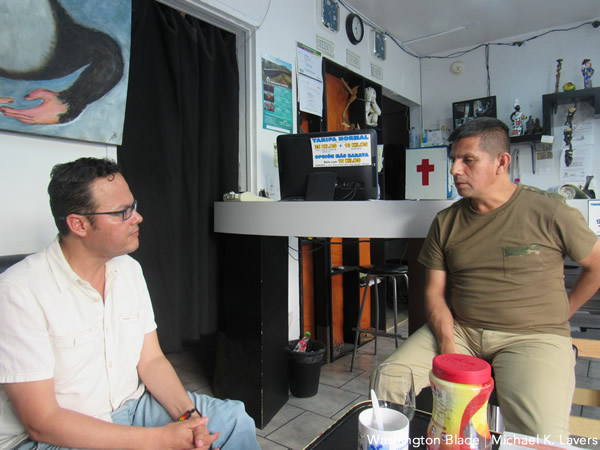
From left: Jorge Luis Villa of Espacio Migrante talks with Andrés Cruz Hernández of Comunidad Cultural de Tijuana LGBTI in Tijuana, Mexico, on July 20, 2018. (Washington Blade photo by Michael K. Lavers)
Griffen’s church provides legal services to low-income immigrants, refugees and asylum seekers through Justice for Our Neighbors, a United Methodist Church ministry. Díaz works with Binational Health Week, a consortium that promotes improved access to health care for disadvantaged Latinos in the U.S. and Canada, and has referred clients to the Mexican consulate in Calexico, a city in the Imperial Valley that is across the U.S.-Mexico border from Mexicali.
Griffen told the Blade he has seen “a lot more fearfulness and a lot more uncertainty” since Trump took office.
“We have clients that have waited over 20 years to get their court date,” said Griffen. “They’re kind of scared to death that something’s going to go wrong.”
Imperial Valley LGBT group trains ICE, Border Patrol
ICE since 2015 requires personnel to allow trans detainees to identify themselves based on their gender identity on data forms. This guidance also instructs personnel to consider placing trans detainees in facilities that have experience providing hormone therapy and other trans-specific care and advises against placement segregated housing units unless its a last resort.
Díaz told the Blade she received a call from the Transgender Law Center in late 2014, a few months before the Imperial Valley LGBT Resource Center officially became an organization, about a trans woman in ICE custody who was not receiving hormones while in ICE custody and was not being housed with female detainees. Díaz said the trans woman eventually received hormones before her release.
“She was homeless,” she said. “She was on the streets in Calexico, so she feels they let her go because they didn’t want to pay for her hormones.”
The Imperial Valley LGBT Resource Center now conducts trainings with ICE and Border Patrol that focus on improving the treatment of LGBTI detainees.
Díaz told the Blade a Border Patrol officer who attended one of these trainings was a trans woman. Díaz also said one of the facilitators of the Imperial Valley LGBT Resource Center’s trans support groups is a trans man who works for Border Patrol.
She conceded ICE and Border Patrol weren’t “prepared” to handle the increased number of trans migrants who have entered the U.S. Díaz nevertheless said she feels the organizations are making a “good faith” effort to improve conditions for trans and lesbian, gay, bisexual and intersex migrants in their custody in spite of the criticism they continue to face from advocates.
“As long as they are allowing us to come in there and talk about this and let them know they’re not they’re not identifying as the opposite sex to hide, this is who they are and this is why they are running for their safety and for them to implement policies to better care for them, I think that we’re making an impact in that way,” she told the Blade.
Díaz, like Villa in Tijuana, also said immigration was a contentious issue in the U.S. long before Trump took office.
“Immigration has been an issue for years,” said Díaz. “Children being separated from their parents; it’s been an issue for years. We are talking about it now.”
“It’s getting the attention it should have gotten years back,” she added. “Now we have to concentrate on what is the best thing we can do not only for the immigrants, but for our citizens. What can we do to protect our citizens as well as protect those that are coming over here running away from the violence in their countries.”
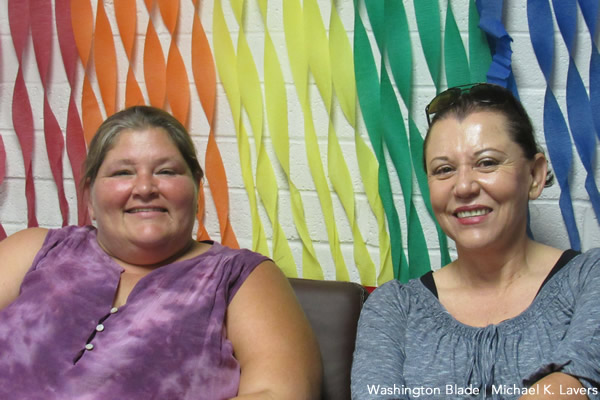
From left: SMART Recovery USA Imperial County Regional Coordinator Susan Roberta Ireland Mears and Imperial Valley LGBT Resource Center CEO Rosa Díaz at the Imperial Valley LGBT Resource Center’s offices in El Centro, Calif., on July 20, 2018. The city, which is located in California’s Imperial Valley, is roughly 12 miles north of the U.S.-Mexico border. (Washington Blade photo by Michael K. Lavers)
homepage news
Honoring the legacy of New Orleans’ 1973 UpStairs Lounge fire
Why the arson attack that killed 32 gay men still resonates 50 years later

On June 23 of last year, I held the microphone as a gay man in the New Orleans City Council Chamber and related a lost piece of queer history to the seven council members. I told this story to disabuse all New Orleanians of the notion that silence and accommodation, in the face of institutional and official failures, are a path to healing.
The story I related to them began on a typical Sunday night at a second-story bar on the fringe of New Orleans’ French Quarter in 1973, where working-class men would gather around a white baby grand piano and belt out the lyrics to a song that was the anthem of their hidden community, “United We Stand” by the Brotherhood of Man.
“United we stand,” the men would sing together, “divided we fall” — the words epitomizing the ethos of their beloved UpStairs Lounge bar, an egalitarian free space that served as a forerunner to today’s queer safe havens.
Around that piano in the 1970s Deep South, gays and lesbians, white and Black queens, Christians and non-Christians, and even early gender minorities could cast aside the racism, sexism, and homophobia of the times to find acceptance and companionship for a moment.
For regulars, the UpStairs Lounge was a miracle, a small pocket of acceptance in a broader world where their very identities were illegal.
On the Sunday night of June 24, 1973, their voices were silenced in a murderous act of arson that claimed 32 lives and still stands as the deadliest fire in New Orleans history — and the worst mass killing of gays in 20th century America.
As 13 fire companies struggled to douse the inferno, police refused to question the chief suspect, even though gay witnesses identified and brought the soot-covered man to officers idly standing by. This suspect, an internally conflicted gay-for-pay sex worker named Rodger Dale Nunez, had been ejected from the UpStairs Lounge screaming the word “burn” minutes before, but New Orleans police rebuffed the testimony of fire survivors on the street and allowed Nunez to disappear.
As the fire raged, police denigrated the deceased to reporters on the street: “Some thieves hung out there, and you know this was a queer bar.”
For days afterward, the carnage met with official silence. With no local gay political leaders willing to step forward, national Gay Liberation-era figures like Rev. Troy Perry of the Metropolitan Community Church flew in to “help our bereaved brothers and sisters” — and shatter officialdom’s code of silence.
Perry broke local taboos by holding a press conference as an openly gay man. “It’s high time that you people, in New Orleans, Louisiana, got the message and joined the rest of the Union,” Perry said.
Two days later, on June 26, 1973, as families hesitated to step forward to identify their kin in the morgue, UpStairs Lounge owner Phil Esteve stood in his badly charred bar, the air still foul with death. He rebuffed attempts by Perry to turn the fire into a call for visibility and progress for homosexuals.
“This fire had very little to do with the gay movement or with anything gay,” Esteve told a reporter from The Philadelphia Inquirer. “I do not want my bar or this tragedy to be used to further any of their causes.”
Conspicuously, no photos of Esteve appeared in coverage of the UpStairs Lounge fire or its aftermath — and the bar owner also remained silent as he witnessed police looting the ashes of his business.
“Phil said the cash register, juke box, cigarette machine and some wallets had money removed,” recounted Esteve’s friend Bob McAnear, a former U.S. Customs officer. “Phil wouldn’t report it because, if he did, police would never allow him to operate a bar in New Orleans again.”
The next day, gay bar owners, incensed at declining gay bar traffic amid an atmosphere of anxiety, confronted Perry at a clandestine meeting. “How dare you hold your damn news conferences!” one business owner shouted.
Ignoring calls for gay self-censorship, Perry held a 250-person memorial for the fire victims the following Sunday, July 1, culminating in mourners defiantly marching out the front door of a French Quarter church into waiting news cameras. “Reverend Troy Perry awoke several sleeping giants, me being one of them,” recalled Charlene Schneider, a lesbian activist who walked out of that front door with Perry.

Esteve doubted the UpStairs Lounge story’s capacity to rouse gay political fervor. As the coroner buried four of his former patrons anonymously on the edge of town, Esteve quietly collected at least $25,000 in fire insurance proceeds. Less than a year later, he used the money to open another gay bar called the Post Office, where patrons of the UpStairs Lounge — some with visible burn scars — gathered but were discouraged from singing “United We Stand.”
New Orleans cops neglected to question the chief arson suspect and closed the investigation without answers in late August 1973. Gay elites in the city’s power structure began gaslighting the mourners who marched with Perry into the news cameras, casting suspicion on their memories and re-characterizing their moment of liberation as a stunt.
When a local gay journalist asked in April 1977, “Where are the gay activists in New Orleans?,” Esteve responded that there were none, because none were needed. “We don’t feel we’re discriminated against,” Esteve said. “New Orleans gays are different from gays anywhere else… Perhaps there is some correlation between the amount of gay activism in other cities and the degree of police harassment.”

An attitude of nihilism and disavowal descended upon the memory of the UpStairs Lounge victims, goaded by Esteve and fellow gay entrepreneurs who earned their keep via gay patrons drowning their sorrows each night instead of protesting the injustices that kept them drinking.
Into the 1980s, the story of the UpStairs Lounge all but vanished from conversation — with the exception of a few sanctuaries for gay political debate such as the local lesbian bar Charlene’s, run by the activist Charlene Schneider.
By 1988, the 15th anniversary of the fire, the UpStairs Lounge narrative comprised little more than a call for better fire codes and indoor sprinklers. UpStairs Lounge survivor Stewart Butler summed it up: “A tragedy that, as far as I know, no good came of.”
Finally, in 1991, at Stewart Butler and Charlene Schneider’s nudging, the UpStairs Lounge story became aligned with the crusade of liberated gays and lesbians seeking equal rights in Louisiana. The halls of power responded with intermittent progress. The New Orleans City Council, horrified by the story but not yet ready to take its look in the mirror, enacted an anti-discrimination ordinance protecting gays and lesbians in housing, employment, and public accommodations that Dec. 12 — more than 18 years after the fire.
“I believe the fire was the catalyst for the anger to bring us all to the table,” Schneider told The Times-Picayune, a tacit rebuke to Esteve’s strategy of silent accommodation. Even Esteve seemed to change his stance with time, granting a full interview with the first UpStairs Lounge scholar Johnny Townsend sometime around 1989.
Most of the figures in this historic tale are now deceased. What’s left is an enduring story that refused to go gently. The story now echoes around the world — a musical about the UpStairs Lounge fire recently played in Tokyo, translating the gay underworld of the 1973 French Quarter for Japanese audiences.
When I finished my presentation to the City Council last June, I looked up to see the seven council members in tears. Unanimously, they approved a resolution acknowledging the historic failures of city leaders in the wake of the UpStairs Lounge fire.
Council members personally apologized to UpStairs Lounge families and survivors seated in the chamber in a symbolic act that, though it could not bring back those who died, still mattered greatly to those whose pain had been denied, leaving them to grieve alone. At long last, official silence and indifference gave way to heartfelt words of healing.
The way Americans remember the past is an active, ongoing process. Our collective memory is malleable, but it matters because it speaks volumes about our maturity as a people, how we acknowledge the past’s influence in our lives, and how it shapes the examples we set for our youth. Do we grapple with difficult truths, or do we duck accountability by defaulting to nostalgia and bluster? Or worse, do we simply ignore the past until it fades into a black hole of ignorance and indifference?
I believe that a factual retelling of the UpStairs Lounge tragedy — and how, 50 years onward, it became known internationally — resonates beyond our current divides. It reminds queer and non-queer Americans that ignoring the past holds back the present, and that silence is no cure for what ails a participatory nation.
Silence isolates. Silence gaslights and shrouds. It preserves the power structures that scapegoat the disempowered.
Solidarity, on the other hand, unites. Solidarity illuminates a path forward together. Above all, solidarity transforms the downtrodden into a resounding chorus of citizens — in the spirit of voices who once gathered ‘round a white baby grand piano and sang, joyfully and loudly, “United We Stand.”

Robert W. Fieseler is a New Orleans-based journalist and the author of “Tinderbox: the Untold Story of the Up Stairs Lounge Fire and the Rise of Gay Liberation.”
homepage news
New Supreme Court term includes critical LGBTQ case with ‘terrifying’ consequences
Business owner seeks to decline services for same-sex weddings

The U.S. Supreme Court, after a decision overturning Roe v. Wade that still leaves many reeling, is starting a new term with justices slated to revisit the issue of LGBTQ rights.
In 303 Creative v. Elenis, the court will return to the issue of whether or not providers of custom-made goods can refuse service to LGBTQ customers on First Amendment grounds. In this case, the business owner is Lorie Smith, a website designer in Colorado who wants to opt out of providing her graphic design services for same-sex weddings despite the civil rights law in her state.
Jennifer Pizer, acting chief legal officer of Lambda Legal, said in an interview with the Blade, “it’s not too much to say an immeasurably huge amount is at stake” for LGBTQ people depending on the outcome of the case.
“This contrived idea that making custom goods, or offering a custom service, somehow tacitly conveys an endorsement of the person — if that were to be accepted, that would be a profound change in the law,” Pizer said. “And the stakes are very high because there are no practical, obvious, principled ways to limit that kind of an exception, and if the law isn’t clear in this regard, then the people who are at risk of experiencing discrimination have no security, no effective protection by having a non-discrimination laws, because at any moment, as one makes their way through the commercial marketplace, you don’t know whether a particular business person is going to refuse to serve you.”
The upcoming arguments and decision in the 303 Creative case mark a return to LGBTQ rights for the Supreme Court, which had no lawsuit to directly address the issue in its previous term, although many argued the Dobbs decision put LGBTQ rights in peril and threatened access to abortion for LGBTQ people.
And yet, the 303 Creative case is similar to other cases the Supreme Court has previously heard on the providers of services seeking the right to deny services based on First Amendment grounds, such as Masterpiece Cakeshop and Fulton v. City of Philadelphia. In both of those cases, however, the court issued narrow rulings on the facts of litigation, declining to issue sweeping rulings either upholding non-discrimination principles or First Amendment exemptions.
Pizer, who signed one of the friend-of-the-court briefs in opposition to 303 Creative, said the case is “similar in the goals” of the Masterpiece Cakeshop litigation on the basis they both seek exemptions to the same non-discrimination law that governs their business, the Colorado Anti-Discrimination Act, or CADA, and seek “to further the social and political argument that they should be free to refuse same-sex couples or LGBTQ people in particular.”
“So there’s the legal goal, and it connects to the social and political goals and in that sense, it’s the same as Masterpiece,” Pizer said. “And so there are multiple problems with it again, as a legal matter, but also as a social matter, because as with the religion argument, it flows from the idea that having something to do with us is endorsing us.”
One difference: the Masterpiece Cakeshop litigation stemmed from an act of refusal of service after owner, Jack Phillips, declined to make a custom-made wedding cake for a same-sex couple for their upcoming wedding. No act of discrimination in the past, however, is present in the 303 Creative case. The owner seeks to put on her website a disclaimer she won’t provide services for same-sex weddings, signaling an intent to discriminate against same-sex couples rather than having done so.
As such, expect issues of standing — whether or not either party is personally aggrieved and able bring to a lawsuit — to be hashed out in arguments as well as whether the litigation is ripe for review as justices consider the case. It’s not hard to see U.S. Chief Justice John Roberts, who has sought to lead the court to reach less sweeping decisions (sometimes successfully, and sometimes in the Dobbs case not successfully) to push for a decision along these lines.
Another key difference: The 303 Creative case hinges on the argument of freedom of speech as opposed to the two-fold argument of freedom of speech and freedom of religious exercise in the Masterpiece Cakeshop litigation. Although 303 Creative requested in its petition to the Supreme Court review of both issues of speech and religion, justices elected only to take up the issue of free speech in granting a writ of certiorari (or agreement to take up a case). Justices also declined to accept another question in the petition request of review of the 1990 precedent in Smith v. Employment Division, which concluded states can enforce neutral generally applicable laws on citizens with religious objections without violating the First Amendment.
Representing 303 Creative in the lawsuit is Alliance Defending Freedom, a law firm that has sought to undermine civil rights laws for LGBTQ people with litigation seeking exemptions based on the First Amendment, such as the Masterpiece Cakeshop case.
Kristen Waggoner, president of Alliance Defending Freedom, wrote in a Sept. 12 legal brief signed by her and other attorneys that a decision in favor of 303 Creative boils down to a clear-cut violation of the First Amendment.
“Colorado and the United States still contend that CADA only regulates sales transactions,” the brief says. “But their cases do not apply because they involve non-expressive activities: selling BBQ, firing employees, restricting school attendance, limiting club memberships, and providing room access. Colorado’s own cases agree that the government may not use public-accommodation laws to affect a commercial actor’s speech.”
Pizer, however, pushed back strongly on the idea a decision in favor of 303 Creative would be as focused as Alliance Defending Freedom purports it would be, arguing it could open the door to widespread discrimination against LGBTQ people.
“One way to put it is art tends to be in the eye of the beholder,” Pizer said. “Is something of a craft, or is it art? I feel like I’m channeling Lily Tomlin. Remember ‘soup and art’? We have had an understanding that whether something is beautiful or not is not the determining factor about whether something is protected as artistic expression. There’s a legal test that recognizes if this is speech, whose speech is it, whose message is it? Would anyone who was hearing the speech or seeing the message understand it to be the message of the customer or of the merchants or craftsmen or business person?”
Despite the implications in the case for LGBTQ rights, 303 Creative may have supporters among LGBTQ people who consider themselves proponents of free speech.
One joint friend-of-the-court brief before the Supreme Court, written by Dale Carpenter, a law professor at Southern Methodist University who’s written in favor of LGBTQ rights, and Eugene Volokh, a First Amendment legal scholar at the University of California, Los Angeles, argues the case is an opportunity to affirm the First Amendment applies to goods and services that are uniquely expressive.
“Distinguishing expressive from non-expressive products in some contexts might be hard, but the Tenth Circuit agreed that Smith’s product does not present a hard case,” the brief says. “Yet that court (and Colorado) declined to recognize any exemption for products constituting speech. The Tenth Circuit has effectively recognized a state interest in subjecting the creation of speech itself to antidiscrimination laws.”
Oral arguments in the case aren’t yet set, but may be announced soon. Set to defend the state of Colorado and enforcement of its non-discrimination law in the case is Colorado Solicitor General Eric Reuel Olson. Just this week, the U.S. Supreme Court announced it would grant the request to the U.S. solicitor general to present arguments before the justices on behalf of the Biden administration.
With a 6-3 conservative majority on the court that has recently scrapped the super-precedent guaranteeing the right to abortion, supporters of LGBTQ rights may think the outcome of the case is all but lost, especially amid widespread fears same-sex marriage would be next on the chopping block. After the U.S. Tenth Circuit Court of Appeals ruled against 303 Creative in the lawsuit, the simple action by the Supreme Court to grant review in the lawsuit suggests they are primed to issue a reversal and rule in favor of the company.
Pizer, acknowledging the call to action issued by LGBTQ groups in the aftermath of the Dobbs decision, conceded the current Supreme Court issuing the ruling in this case is “a terrifying prospect,” but cautioned the issue isn’t so much the makeup of the court but whether or not justices will continue down the path of abolishing case law.
“I think the question that we’re facing with respect to all of the cases or at least many of the cases that are in front of the court right now, is whether this court is going to continue on this radical sort of wrecking ball to the edifice of settled law and seemingly a goal of setting up whole new structures of what our basic legal principles are going to be. Are we going to have another term of that?” Pizer said. “And if so, that’s terrifying.”
homepage news
Kelley Robinson, a Black, queer woman, named president of Human Rights Campaign
Progressive activist a veteran of Planned Parenthood Action Fund

Kelley Robinson, a Black, queer woman and veteran of Planned Parenthood Action Fund, is to become the next president of the Human Rights Campaign, the nation’s leading LGBTQ group announced on Tuesday.
Robinson is set to become the ninth president of the Human Rights Campaign after having served as executive director of Planned Parenthood Action Fund and more than 12 years of experience as a leader in the progressive movement. She’ll be the first Black, queer woman to serve in that role.
“I’m honored and ready to lead HRC — and our more than three million member-advocates — as we continue working to achieve equality and liberation for all Lesbian, Gay, Bisexual, Transgender, and Queer people,” Robinson said. “This is a pivotal moment in our movement for equality for LGBTQ+ people. We, particularly our trans and BIPOC communities, are quite literally in the fight for our lives and facing unprecedented threats that seek to destroy us.”
The next Human Rights Campaign president is named as Democrats are performing well in polls in the mid-term elections after the U.S. Supreme Court overturned Roe v. Wade, leaving an opening for the LGBTQ group to play a key role amid fears LGBTQ rights are next on the chopping block.
“The overturning of Roe v. Wade reminds us we are just one Supreme Court decision away from losing fundamental freedoms including the freedom to marry, voting rights, and privacy,” Robinson said. “We are facing a generational opportunity to rise to these challenges and create real, sustainable change. I believe that working together this change is possible right now. This next chapter of the Human Rights Campaign is about getting to freedom and liberation without any exceptions — and today I am making a promise and commitment to carry this work forward.”
The Human Rights Campaign announces its next president after a nearly year-long search process after the board of directors terminated its former president Alphonso David when he was ensnared in the sexual misconduct scandal that led former New York Gov. Andrew Cuomo to resign. David has denied wrongdoing and filed a lawsuit against the LGBTQ group alleging racial discrimination.

-

 U.S. Supreme Court4 days ago
U.S. Supreme Court4 days agoSupreme Court upholds ACA rule that makes PrEP, other preventative care free
-

 U.S. Supreme Court5 days ago
U.S. Supreme Court5 days agoSupreme Court rules parents must have option to opt children out of LGBTQ-specific lessons
-

 Television5 days ago
Television5 days ago‘White Lotus,’ ‘Severance,’ ‘Andor’ lead Dorian TV Awards noms
-

 Music & Concerts5 days ago
Music & Concerts5 days agoBerkshire Choral to commemorate Matthew Shepard’s life



